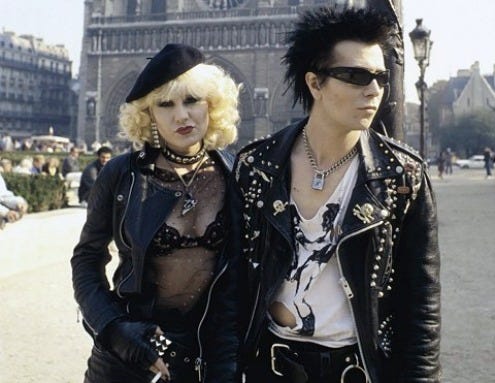Sid and Nancy (1986)

"Sid and Nancy" is a film about repulsion. It's the story of the punk-rock movement, which embraced nihilism with a swagger and a sneer, or at least it did in its early days with the Sex Pistols and the rest. Soon the Police were singing ballads and Billy Idol came along to give it a slick MTV veneer, and punk was co-opted and commoditized like a thousand rebellions that came before.
Sid Vicious and Nancy Spungen were not sellouts. Maybe if they'd lived long enough, they would have embraced being part of regular society instead of spurning it. But they died young, after Nancy was stabbed to death — mostly likely by Sid — and he overdosed on heroin in 1979 before his trial for her murder.
The interesting thing about modern pop culture — say, since 1955 — is how people embrace those who spit on social norms. Rebellion became cool, which is how Sid Vicious and the Sex Pistols could become icons despite their obvious disdain for those who listened to their music and showed up to their concerts.
Even by the Sex Pistols' standards, Sid (Gary Oldman, in his breakout role) was out there. Ostensibly he was their bass player, but even his band mates acknowledged he was a terrible musician who might as well have been playing a different song. When not on stage, he was usually drunk or high ... and often when on the stage, too. He cut himself with razors and got into fights just for the pleasure of the violence.
Johnny Rotten, the anarchic but calculating frontman for the Pistols (played by Andrew Schofield), sums it up by calling Sid "a fabulous disaster."
The film was directed and co-written (with Abbe Wool) by Alex Cox, who had a brief heyday with this film and "Repo Man," and then disappeared deep into low-budget indie obscurity. He approaches the material with energy and wit, though the film doesn't have as much emotional punch as it should.
This is, after all, the story of two people who threw their lives away on drugs and what today we would call co-dependency. Sid and Nancy were in love, or at least what they conceived of as love, but they were too enamored with the rush of heroin and other hard drugs to have much empathy for anyone but themselves. In the film's depiction, Nancy (Chloe Webb) broke up the Sex Pistols because she pulled Sid out of their orbit and into hers.
Something I don't think the movie sufficiently touches on is just how young Nancy and Sid were. They projected a world-weary cool, but they were naifs: Sid was just 21 when he died, and Nancy was a mere 20. Most people that age are considered a smashing success if they've managed to move out of their parents' house; these two sought to bring the world to its knees when they were still teenagers.
Both Oldman and Webb were around 30 when the movie was made, and those few years make all the difference in terms of capturing the wild, noxious innocence of youthful rebellion. Ironically, if Cox had cast actors who were the appropriate age, they probably couldn't have pulled off the performances.
Oldman lost a lot of weight to play the role, and in one scene where we see Sid and Nancy walking away from the camera, we can see that he's actually thinner than Webb — who was borderline scary-skinny herself.
Webb is an abrasive presence as Nancy — so off-putting, in fact, that we wonder what in the world Sid ever saw in her. In my experience, people who get into relationships with someone who's openly abusive to them do so because their self-worth is so low: They think they don't deserve any better. Since Sid arrives at the beginning of the movie fully formed, we don't grasp why he was attracted to her since she so obviously sought only to glom onto somebody — anybody, really — who was famous.
Oldman and Webb nail the surface of these people, but we never get inside their hearts and heads. Their characters remain a spectacle, to be amazed at and pitied but never understood.
Much of the attention about Vicious and Spungen, and by extension this film, centered on the circumstances of her death. But I found that the least interesting thing about the movie. If Sid hadn't knifed her in a haze of drug-induced fighting, then she was already set on the path leading to a similar demise.
Sid's was just the final one of the proverbial thousand cuts.
The film's crowning achievement is depicting the soul-sucking toll that drugs take on the talented and the naive. It's notable that Cox doesn't depict Sid and Nancy actually shooting up until near the end of the film; the lateness serves to underline just how exacting heroin addiction is, since its abusers end up becoming amateur physicians with an encyclopedic knowledge of a wide range of pharmacological effects.
In the beginning, junkies take drugs because they think it intensifies their personality. Later, when they're hooked, they find they need that razor's edge all the time, despite the fact it becomes harder to reach and maintain. Eventually, drugs replace the people they were, and they turn into mere vessels to an all-consuming craving. They become their addiction.
Heroin didn't just kill Sid and Nancy's romance; it overwhelmed and consumed it.
"Sid and Nancy" is an often engrossing tale of human degradation substituting for love. What a horrifying trade to make.
4 Yaps



